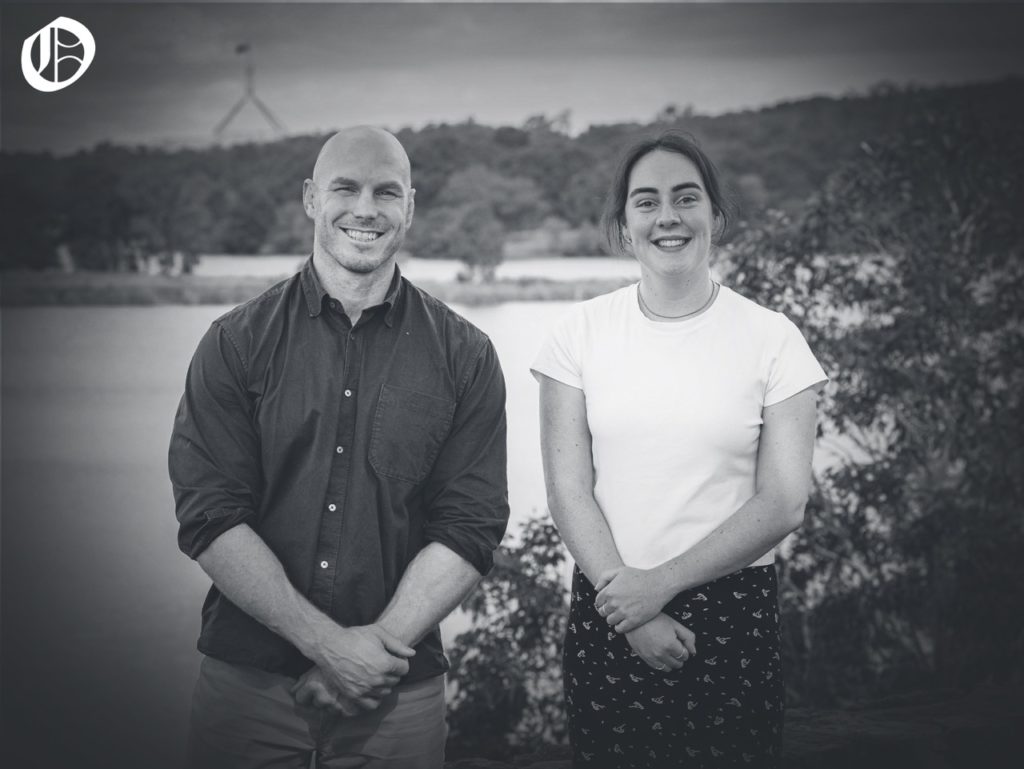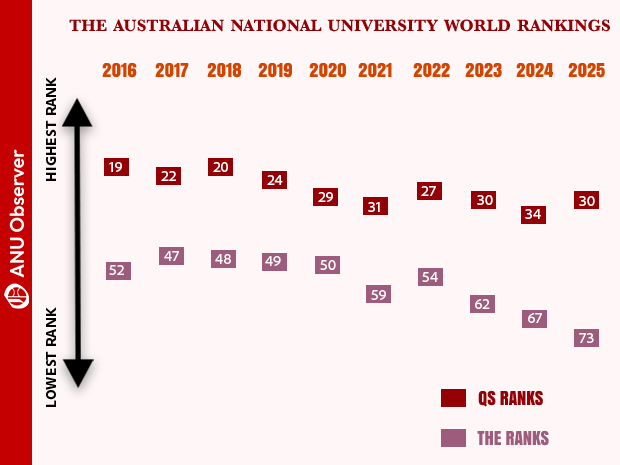Confirmed Staff Cuts and Significant Restructuring at College Of Science

By Eleanor Ellis
The ANU College of Science (CoS) released its Change Implementation Plan on 15 December, outlining key changes to be made to the professional and academic staffing profile within the Centre for Public Awareness of Science, Research School of Biology, Research School of Chemistry, Research School of Earth Sciences, and Research School of Physics. The changes are due to commence on 11 January 2021.
The changes included in the Implementation Plan are based on the ANU Recovery Plan, which addresses the University’s main strategic and financial challenges caused by the COVID-19 pandemic. This includes an overall reduction in staff and a smaller student cohort. Relative to this year’s budget, the 2021 CoS budget has been reduced by $7.2 million.
The key changes in the Implementation Plan include: disestablishment of 75 professional and academic positions, establishment of 20 positions, narrowing of research focus, departmental restructuring, and reshaping staff workforce profiles. The University claims the restructuring will also “encourage greater interaction and integration” of efforts in research, training and education.
The Implementation Plan noted that 36 staff members have already voluntarily departed or will voluntarily depart from the University in the coming months. Academic staff currently funded from recurrent, grant, and contract funding are not significantly impacted by the Implementation Plan. Staff who have lost their jobs under the new structure have 12 weeks to apply for “a suitable alternative position”.
The 12 week redeployment period began on 23 December, three weeks sooner than the proposed implementation date for the outlined changes. ANU is currently in its end of year shutdown which lasts from 23 December to 4 January 2021. According to a National Tertiary Education Union (NTEU) Media Release, this means staff have been advised to apply for jobs while the University will not be open to advertise vacancies or review applications.
The NTEU has called for the redeployment period to commence no earlier than 11 January 2021. NTEU ANU Branch President Simon Copland has called the bringing forward of the redeployment “a shameful attempt by the university to rush job cuts before the end of the year…[making] a difficult process much more difficult, flying in the face of their state appreciation for these long-serving staff”.
A University spokesperson has reportedly said, “It is not our usual practice to run redeployment processes over the end of year shutdown, however we are facing unprecedented times”. The spokesperson also reportedly stated that affected staff could consider available positions before during and after the end of year shutdown.
According to the Implementation Plan, if an HDR student’s principal supervisor is not appointed to a new role they will be advised in person by the relevant school’s Associate Director (HDR). Relevant staff will then make recommendations about suitable alternatives. However, if a suitable principal supervisor can’t be found, the Associate Director (HDR) “will work with the student and staff…to identify a suitable replacement from within the disciplinary network of universities in Australia and internationally”.
Overview of the Implementation Plan’s key changes
Centre for Public Awareness of Science (CPAS)
- Academic Staff Changes: Seven positions directly transferred, and one position disestablished.
- There will no longer be a dedicated role for Science Communication in Popular Culture, and the work will be redistributed across the Centre.
- A new role, the Associate Director of Engagement, was created to increase engagement with alumni and international stakeholders following a 2019 review.
- The Implementation Plan will not result in the disestablishment of any CPAS compulsory courses, and supervisory structures remain unchanged.
Research School of Biology (RSB)
- Professional Staff Changes: Thirteen positions established, twenty-one positions directly transferred, and twenty positions disestablished.
- Reorganisation of Professional staff, which the school claims will promote sharing of infrastructure, resources, and technical expertise.
- Reorganisation of the School Service Team to provide a broader range of technical support to research groups.
- No direct impact on The Biology Teaching and Learning Centre.
Research School of Chemistry (RSC)
- Academic Staff Changes: Nineteen positions directly transferred, and six positions disestablished.
- Professional Staff Changes: Four positions established, fourteen positions directly transferred, and eight positions disestablished.
- There will be an overall reduction in second and third year courses, with up to half being disestablished or combined with similar courses.
- Undergraduate Convenor position will be disestablished, and responsibilities will be redistributed.
- Research activities across the School will be organised into three clusters of Chemical Biology, Materials, and Synthesis, reflecting an overall narrowing of research areas.
- The RSC/RSB Joint Workshop, which currently provides repair, maintenance and ‘design and build’ services to both Schools, will be disestablished and positions will be redistributed across the two Schools.
Research School of Earth Sciences (RSES)
- Academic Staff Changes: Twenty positions directly transferred, eight positions disestablished.
- Professional Staff Changes: Twenty-four positions directly transferred, two positions will be reclassified (reflecting an increase in and changes to responsibilities and requirements), and twelve positions disestablished.
- Staff reductions were based on factors including primary areas of research activity, potential to attract funding, and the level of contribution to teaching.
- The existing seven research groups will be consolidated into three, tentatively named Geochemistry, Geophysics, and Environmental Geoscience and Oceanography.
- Professional technical staff will be consolidated into three teams, Geophysical Data and Computation, Geochemical Operations, and Laboratory Operations.
- Academic staff will be required to have a minimum of 25% commitment to teaching and coursework delivery, excluding those with external fellowships.
- The University claims “these changes will prioritise staff diversity by preserving the current gender balance as a minimum”.
- The School will no longer be running its dedicated mechanical workshop facility due to a decline in demand for the service. RSES says it is working to ensure staff and students will have access to other suitable continuing mechanical workshop facilities.
During the consultation period for the implementation plan which ran from 24 November to 8 December, concerns were raised about the University’s commitment to supporting the Sensitive High-Resolution Ion Microprobes (SHRIMP) facility). The RSES will continue to support future research, but will discontinue the development and manufacturing of new SHIMP instruments. A transitional SHRIMP steering committee will be formed to give scientific leadership and management, and a detailed plan for the SHRIMP facility will be presented and discussed with staff in 2021.
Concerns were also raised about the quality of research groups impacted by structural changes. Staff currently in research groups who will change reporting lines will still remain closely associated with their group and area of study, whilst staff fully funded by external funds will continue with their current supervisor.
Research School of Physics (RSPhys)
- Academic Staff Changes: Thirty positions directly transferred, and five positions disestablished.
- Professional Staff Changes: three positions established, forty-two positions directly transferred, and sixteen positions disestablished.
- Academic staff will be required to have a minimum of 25% commitment to teaching and coursework delivery, excluding those with external fellowship. Recipients of external fellowships are financially and professionally supported by non-university sponsors, such as government agencies, corporations, and foundations. They are provided to staff who have demonstrated experience in teaching and learning, have engaged with relevant professional development, and are committed to acting as a professional higher education educator.
- The current 8 departments will be reduced and restructured into 5 new departments established around common resources and capabilities, one of which will host theorists, with a minimum of seven continuing academic positions within each department.
- Research groups for Molecular Machines, Physics of Fluids, Mathematical Physics and Laser Processing will no longer be pursued. The Implementation plan suggests that this is a result of decreased revenue in recent years which has supposedly caused more integration in training and education, and a narrowing focus of research.
This article has been edited to clarify a claim made by the NTEU and to clarify a quote from a University spokesperson.
Graphics by Joseph Oh
Know something we don’t know? Email [email protected] or use our anonymous tip submission.
If you have an issue with this article, or a correction to make, you can contact us at [email protected], submit a formal dispute, or angery react the Facebook post.
Want to get involved? You can write articles, photograph, livestream or do web support. We’re also looking for someone to yell “extra!” outside Davey Lodge at 1AM. Apply today!









